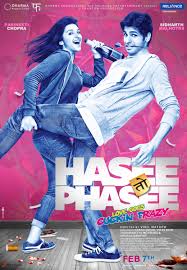When opposites collide in Bollywood, it often leads to a mix of humor and drama, but in this case, it leads to something far more heartwarming. Starring Parineeti Chopra and Sidharth Malhotra, Hasee Toh Phasee is a romantic comedy set in Mumbai, oscillating between the chaos of wedding preparations and the deeper turmoil of personal insecurities. Directed by Vinil Mathew, this movie brings together an unusual pairing and manages to create a quirky yet tender love story that breaks away from typical Bollywood tropes.
The plot centers around Nikhil, a commitment-phobic, good-hearted guy who is about to marry the girl of his dreams, Karishma. Enter Meeta, Karishma’s estranged, eccentric sister, who returns home after years of being away. As Nikhil is roped in to keep Meeta out of sight from the family during the wedding chaos, they slowly begin to bond. Meeta’s strange habits, her sharp intellect, and her vulnerability draw Nikhil closer, sparking a connection that neither of them saw coming. As they grow closer, Nikhil must confront his own doubts about love and commitment, while Meeta deals with her troubled past. Without giving too much away, the story moves toward a charming and unexpected resolution, filled with laughs, tears, and moments of introspection.
One standout aspect of the film is the acting. Parineeti as Meeta delivers an outstanding performance, bringing a level of quirkiness and authenticity that’s rare to see. Meeta is an unusual character—intelligent yet emotionally fragile, socially awkward yet endearing. Parineeti captures this balance beautifully, making the audience root for her despite her eccentricities. Her portrayal of a woman dealing with personal failures, familial rejection, and an unorthodox way of living feels raw and relatable. Sidharth, as the slightly confused Nikhil, plays his part with subtle charm. While his character could have easily been overshadowed by Parineeti’s Meeta, Sidharth holds his ground with an understated performance, portraying Nikhil’s struggle between responsibility and his growing feelings for Meeta with ease. The chemistry between the two leads is natural and understated, creating moments that feel genuine rather than forced.
The direction by Vinil Mathew is refreshing. What stands out about his work is how he handles the characters’ emotional journeys without turning the film into a melodramatic saga. The humor is well-timed, and the romantic elements are subtle, relying more on gestures and silences rather than dramatic declarations. Vinil keeps the pace tight, ensuring that even the slower, more introspective moments don’t feel like they drag. For instance, Meeta’s breakdown moments are handled delicately, without tipping over into the overly sentimental. The balance between humor, romance, and personal conflict is finely tuned.
Another strong element is the film’s music, composed by Vishal-Shekhar. The soundtrack complements the narrative perfectly, adding layers to the emotions the characters experience. Songs like “Zehnaseeb” and “Drama Queen” are not only catchy but also serve the plot well, with “Zehnaseeb” beautifully capturing the growing connection between Nikhil and Meeta. The background score is subtle, enhancing the overall mood of the scenes without being overwhelming. It’s a soundtrack that stays with you long after the movie ends, fitting perfectly into the film’s romantic-comedy genre.
Cinematography by Sanu Varghese is another high point. The film’s visual style is light and vibrant, matching the tone of the narrative. The use of color in the film, especially during the wedding sequences, is a treat for the eyes. The contrast between the grandeur of the wedding and the simplicity of the moments shared between Nikhil and Meeta creates an interesting visual dichotomy. The camera also lingers on small details, like Meeta’s odd, endearing habits or the quieter, more personal moments, which help in deepening the emotional connect with the audience.
Costume design, particularly for Meeta, deserves a mention as well. Meeta’s slightly unkempt look, with her messy hair and casual clothing, contrasts sharply with the polished, fashionable world around her, reinforcing her outsider status within her family and society. Nikhil’s attire, simple and understated, complements his personality as a man torn between tradition and his feelings. The wedding costumes are colorful and grand, but never overdone, reflecting the film’s lighthearted tone.
As for the film’s theme, Hasee Toh Phasee is more than just a love story. At its core, it explores the complexities of relationships—both familial and romantic. The strained bond between Meeta and her family, especially with her father, adds an emotional depth to the narrative. The film touches on themes of acceptance, redemption, and the idea that love doesn’t always come in a perfect package. It’s about finding beauty in imperfection and realizing that sometimes the people who seem the most wrong for us are the ones who truly understand us.
In terms of its flaws, the movie does take some time to find its footing. The first half, though entertaining, seems a bit scattered with too many subplots vying for attention. However, once the focus shifts squarely onto Nikhil and Meeta’s relationship, the film really comes into its own. There are a few clichés, like the big wedding backdrop and the somewhat predictable love triangle, but these are handled in a way that still feels fresh.
Overall, Hasee Toh Phasee is a delightful watch. It’s not just a rom-com with light-hearted moments but also a film that carries emotional weight without becoming overbearing. The quirky yet heartfelt characters, combined with solid performances and a strong directorial hand, make it stand out in a sea of predictable Bollywood romances. If you’re looking for a film that will make you smile, laugh, and even tear up a little, this is the one. It’s perfect for those who enjoy a love story with a touch of offbeat charm and meaningful subtext.
Highly recommended for fans of romantic comedies that are willing to step outside the box and explore characters that don’t fit the typical mold. Hasee Toh Phasee is as much about finding oneself as it is about finding love, and that’s what makes it a refreshing experience in the genre.







